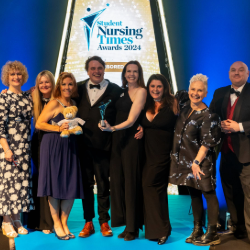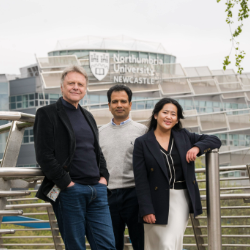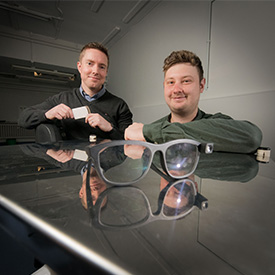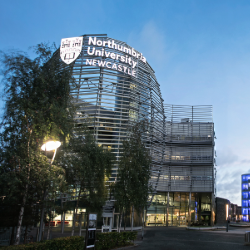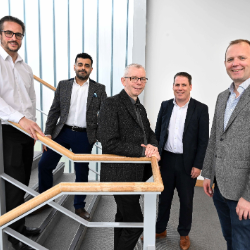-
Study
Study
Interested in studying at Northumbria? With 31,500 students, Northumbria is one of the largest universities in the country, offering courses on either a full-time, part-time or distance learning basis.
Discover more-
Undergraduate
- Undergraduate Study Degree
- Undergraduate Open Day & Events
- Application Guides
- Northumbria University UCAS Exhibitions
- Foundation Years
- Undergraduate Fees & Funding
- School & College Outreach
- Continuing Professional Development
-
Postgraduate
- Postgraduate Study Degree
- Postgraduate Research Degrees
- Postgraduate Open Days and Events
- Postgraduate Fees & Funding
- Flexible Learning
- Thinking about a Masters?
- Continuing Professional Development
- Change Direction
-
Student Life
- The Hub - Student Blog
- Accommodation
- Life in Newcastle
- Support for Students
- Careers
- Information for Parents
- Students' Union
- Northumbria Sport
-
-
International
International
Northumbria’s global footprint touches every continent across the world, through our global partnerships across 17 institutions in 10 countries, to our 277,000 strong alumni community and 150 recruitment partners – we prepare our students for the challenges of tomorrow. Discover more about how to join Northumbria’s global family or our partnerships.
Discover more-
Applying to Northumbria
- European Union
- Our London Campus
- Northumbria Pathway
- International Events
- Entry Requirements
- Agent Network
-
Northumbria Language Centre
- Faculty Requirements
- Acceptable English Requirements
- Pre-Sessional English and Study Skills
- Academic Language Skills Programmes (ALS)
-
International Fees, Funding & Scholarships
- International Undergraduate Fees
- International Undergraduate Funding
- International Masters Fees
- International Masters Funding
- International Postgraduate Research Fees
- International Postgraduate Research Funding
- International Money Matters
-
Life at Northumbria
- International student support
- The Hub - Student Blog
- Careers
-
International Mobility
- Current Northumbria Students
- Incoming Exchange Students
-
-
Business
Business
The world is changing faster than ever before. The future is there to be won by organisations who find ways to turn today's possibilities into tomorrows competitive edge. In a connected world, collaboration can be the key to success.
Discover more -
Research
Research
Northumbria is a research-rich, business-focused, professional university with a global reputation for academic quality. We conduct ground-breaking research that is responsive to the science & technology, health & well being, economic and social and arts & cultural needs for the communities
Discover more -
About Us
-
About Northumbria
- Our Strategy
- Our Staff
- Our Partners
- Student Profiles
- Alumni Profiles
- Leadership & Governance
- Academic Departments
- University Services
- History of Northumbria
- Contact us
- Online Shop
-
-
Alumni
Alumni
Northumbria University is renowned for the calibre of its business-ready graduates. Our alumni network has over 236,000 graduates based in 178 countries worldwide in a range of sectors, our alumni are making a real impact on the world.
Discover more - Work For Us
What will I learn on this module?
This module will help you develop a broad practical understanding of the core technologies employed in the production of immersive environments and digitally mediated audio-visual performance. A series of lectures will offer an overview of the current and emerging immersive technologies and how they are being employed within the Arts and Design, including Contemporary Art, interaction design, music, theatre, film and the games industry. It is expected that there will be cross-over with your theoretical work in Research for Practitioners, particularly around issues of technology and the body, and the ethics of advanced media production, You will also explore critical contextualisation and installation-making, live and live-remote broadcast forms, as well as their VR and AI expansions. Through a series of visually rich lectures you will learn the long history of immersion, as well as the philosophies behind ideas of the technology and experience.
You will be introduced to core technologies through a series of practical workshops and seminars. You will explore key immersive technologies such as real-time audio-visual production and digital performance methods, 3D computer graphics, audio-visuals, virtual reality and projection mapping. You will also be introduced to a range of technologies to interact with digital content using bodily gesture and expression. The module will also demonstrate the creative use of digital and immersive technology, as used by digital and immersive artists, and will enable you to apply your creative skills in a variety of technologically mediated contexts.
Virtual and immersive technologies are complex, and the production of immersive environments and experiences require an interdisciplinary approach which draws from a wide range of creative and technical fields. The module is therefore designed to encourage team working through self-generated projects, and through the creation of short individually designed interactive and/or immersive projects. Working in these ways will allow you to solve complex technological challenges and to create new bodies of original work.
How will I learn on this module?
You will learn through research-led lectures, seminars and practice-based workshops. The lectures will provide you with an in-depth overview of the emerging field of Digital and Immersive Arts, the core technologies and how these are being employed within the Immersive Digital Arts. The lectures on key historical and contemporary work in immersive media will be followed by a series of practical workshops and demonstrations in which you learn the principles of core immersive and interactive technologies. These workshops will cover all the basic areas of immersive media, including 3D design, and audio-visual production. Seminars will be interspersed with these sessions, which will allow you to develop and present initial ideas that will serve as prototypes for the final submission.
While it is expected that you will have a basic familiarity with key technologies and techniques, it is assumed that you will naturally gravitate to your main areas of interest. Working in groups in a short project will allow you to produce rich digital and immersive work that crosses a number of disciplines (interdisciplinarity). You are required to collaborate in groups in order to solve technological challenges and create original interactive and immersive work. Students working in groups will be responsible for managing team dynamics and will be assessed for their ability to plan and manage a group project.
Working independently on a personal project across disciplines (transdisciplinarity) will help you focus on establishing strong digital media skills. In both cases you will be expected to develop high-level skills, research strategies and conceptual ideas in a team and on your own. Students working individually will be assessed for their ability to plan and develop their ideas in a realistic and viable way.
How will I be supported academically on this module?
The programme leader, the module tutors and your project supervisors will all play a role in guiding you throughout the module. You will be guided by tutors with relevant expertise in the intersecting disciplines within the fields of Immersive Arts and are either experienced practitioners, researchers or practitioner-researchers. The seminars will provide key moments for tutor and peer feedback on your ideas and will form the basis on which you will be develop your submitted project. You will also be given the opportunity to have feedback on your research and development in short group or individual sessions with the tutors.
Further academic support is provided via e-Learning tools, such as discussion groups, blogs and wikis. Additional contact with tutors will also be available during office hours by arrangement. Additional support is provided through the English for Specific Academic Purposes (ESAP) module where English is not your first language.
What will I be expected to read on this module?
All modules at Northumbria include a range of reading materials that students are expected to engage with. The reading list for this module can be found at: http://readinglists.northumbria.ac.uk
(Reading List service online guide for academic staff this containing contact details for the Reading List team – http://library.northumbria.ac.uk/readinglists)
What will I be expected to achieve?
Knowledge & Understanding:
• To demonstrate the ability to synthesize technical and creative knowledge from a range of fields to produce an immersive or interactive experience. (KU1)
• To use your knowledge and skills to apply technological, creative and/or critical insights in the development of your creative practice (KU2)
Intellectual / Professional skills & abilities:
• To demonstrate the skill and ability to independently plan, organise, and manage effective research, practice and development to inform your self-determined project. (IPSA1)
• To demonstrate innovation, collaboration and consensus with peers, a project team or collaborative partners to deliver a project to a professional standard. (IPSA1, IPSA2)
Personal Values Attributes (Global / Cultural awareness, Ethics, Curiosity) (PVA):
• To demonstrate the ability and awareness to plan, manage and produce an original professional project which is immersive or has been created using immersive methods. (PVA1)
• To demonstrate the ability to engage in peer feedback and critical self-reflection. (PVA2)
• To demonstrate an understanding and critical engagement with the challenges faced by contemporary culture including the climate crisis, the coronavirus pandemic, Late Capitalism and the encroachment of digital technology (PVA3)
How will I be assessed?
Formative:
Formative assessment will be carried out during the seminars, in which you will present your team-based and individual research, concepts, ideas and experiments. You will also be expected to present your group project in a mid-term presentation. Both peers and tutors will offer practical support and critical feedback during presentations.
Summative:
The summative assessment will consist of two parts:
• Group Immersive Project: A demonstration of your ability to work in a team through the submission of a short group project that demonstrates your group’s ability to use multi-media to create a short demo project that illustrates your ability to synthesize technical and creative knowledge from a variety of fields. Projects should be designed to allow input from the whole group. Submission types include but are not limited to: an immersive game level, a short immersive or interactive video, a short immersive installation.
• Individual Immersive Project: A demonstration of your knowledge and understanding of digital immersive technologies through the production of an independent immersive project. While not all components will necessarily be functioning, you should be capable of showing a short (1-2 minute) interactive or immersive project by the final presentation. Submission types include but are not limited to: a short immersive game, a short audio-visual performance, a short immersive or interactive video, a short immersive installation.
• The practical project will be supported by a short 2000 word reflective document in which you critically reflect upon the work produced, OR a Visually Rich Research Report which should evidence an equivalence in effort, time and the level of research achieved to that of the 2000-word report. You will produce a research report that combines a professional use of image, moving image, audio and text and establishes the personal development your immersive project. This submission may take various forms including, but not limited to the following: a portfolio, a rich-media presentation, or an annotated video.
You will receive feedback in one to one and/or group tutorial and seminar sessions, and at interim and final presentations. Formative assessment will be provided through tutorials or formal presentations. Summative assessment will be written, giving a marks breakdown of how the submission met the individual learning outcomes.
Pre-requisite(s)
N/A
Co-requisite(s)
IA7000
Module abstract
This practice-based module introduces you to the exciting fields of interactive, immersive and digitally mediated arts. A series of lectures will offer an overview of the current and emerging immersive technologies and how they are being employed within the Arts and creative industries. You will be introduced to core technologies such as real-time audio-visual production and digital-enabled performance methods, 3D computer graphics, virtual reality and projection mapping through a series of practical workshops and seminars. You will also be introduced to the history, philosophy and experience of immersive arts through a series of visually rich lectures.
Virtual and immersive technologies are complex, and the production of immersive environments and experiences require an interdisciplinary approach which draws from a wide range of creative and technical fields. The module is therefore designed to encourage team working through self-generated projects, or through collaborations with external creative partners. Team working in this way will allow you to solve complex technological challenges and to create new bodies of original work.
Course info
Credits 40
Level of Study Postgraduate
Mode of Study 1 year full-time
Department Arts
Location City Campus, Northumbria University
City Newcastle
Start September 2024
All information is accurate at the time of sharing.
Full time Courses are primarily delivered via on-campus face to face learning but could include elements of online learning. Most courses run as planned and as promoted on our website and via our marketing materials, but if there are any substantial changes (as determined by the Competition and Markets Authority) to a course or there is the potential that course may be withdrawn, we will notify all affected applicants as soon as possible with advice and guidance regarding their options. It is also important to be aware that optional modules listed on course pages may be subject to change depending on uptake numbers each year.
Contact time is subject to increase or decrease in line with possible restrictions imposed by the government or the University in the interest of maintaining the health and safety and wellbeing of students, staff, and visitors if this is deemed necessary in future.
Your Learning Experience
Find out about our distinctive approach at
www.northumbria.ac.uk/exp
Admissions Terms and Conditions
northumbria.ac.uk/terms
Fees and Funding
northumbria.ac.uk/fees
Admissions Policy
northumbria.ac.uk/adpolicy
Admissions Complaints Policy
northumbria.ac.uk/complaints





